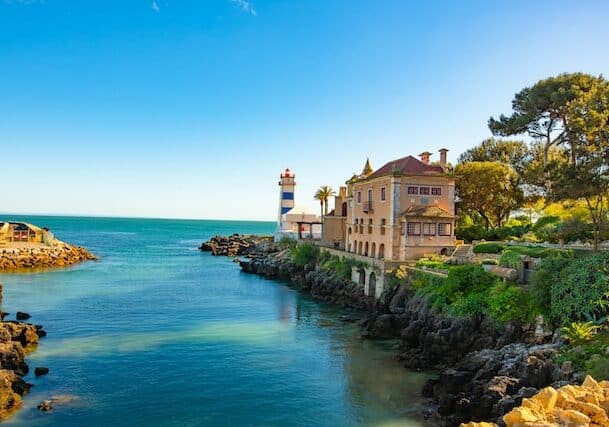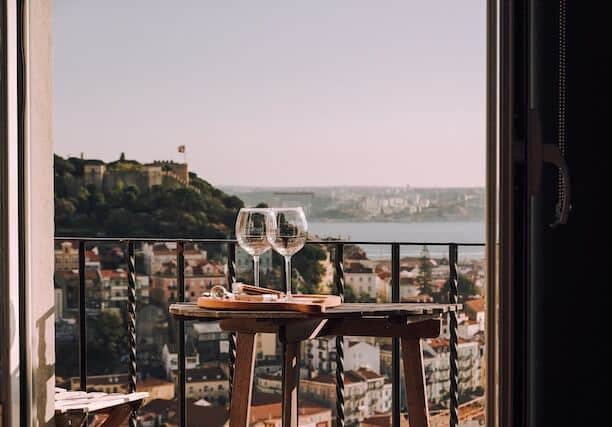
Portugal’s Retirement Visa provides a straightforward and affordable path for non-EU nationals to settle in the country.
Unlike costly investment-based residency programs, this visa is designed for individuals with stable passive income, such as pensions or rental earnings, making it an accessible option for many retirees.
With affordable living costs and top-tier healthcare, Portugal has become an increasingly popular choice. In this guide, we’ll walk you through everything you need to know about Portugal’s Retirement Visa, including:
What should I know about the Portugal retirement visa?
The Portugal D7 Visa, also known as the retirement visa or passive income visa, is a visa program that offers non-EU citizens a route to Portuguese residency. This visa does not require any specific retirement age, but focuses on demonstrating sufficient financial means to support oneself through passive income. This article is a comprehensive guide to the Portugal retirement visa, and below we briefly outline the key aspects of the program:
- Eligibility: The primary requirement is a consistent passive income, such as pensions, rental income, or dividends, that meets a minimum monthly income requirement
- No age requirement: Unlike some retirement programs, the D7 Visa doesn’t have a specific age requirement. It’s designed for individuals with a stable passive income, regardless of their age
- Financial proof: Applicants need to demonstrate a minimum income or savings to support themselves for at least 12 months in Portugal
- Residency requirements: The D7 Visa initially grants a two-year residence permit, which can be renewed for three more years. After five years of legal residency, applicants can apply for Portuguese citizenship
- Family members: Spouses and children of D7 Visa holders can also apply for residency, requiring additional income to be proven.
Benefits of the Portugal D7 Visa
- Residency and citizenship: The visa provides a path to permanent residency and, after five years, the possibility of applying for Portuguese citizenship
- Access to healthcare: D7 Visa holders are entitled to access Portugal’s public healthcare system
- Visa-free travel: Portuguese residency allows visa-free travel within the Schengen area
- Affordable cost of living: Portugal offers a relatively low cost of living compared to many other European countries
⚠️ Portugal Nationality Law Changes 2025
A draft law published in June 2025 proposes major changes to Portugal’s nationality rules. The main change is increasing the residency requirement for citizenship from 5 to 10 years (7 years for CPLP nationals).
It's important to note that the draft proposal is only a set of recommendations, and there are a few more steps before it becomes law. To learn more, read Portugal Nationality Law Changes 2025
Who can retire in Portugal?

It is a residency program designed for non-EU nationals with stable passive income, such as pensions, rental income, or dividends. It allows holders to live in Portugal while benefiting from its affordable cost of living, quality healthcare, and pathway to permanent residency or citizenship.
The visa requires proof of sufficient income (€870 per month for a single applicant), a place to live in Portugal, and compliance with minimum stay requirements. After five years, holders can apply for permanent residency or citizenship.
Another great visa option for retiring is the Portugal Golden Visa. This successful program offers foreign investors, including expat retirees, the possibility of legally residing in Portugal, provided they make a significant investment in the country.
Retiring in Portugal as a US citizen
Portugal’s D7 visa is available for US citizens. In fact, the latest findings from our Global Intelligence Unit’s (GIU) Retirement Guide for US Citizens study revealed that Portugal is a compelling destination for US citizens looking to relocate, ranking second overall. This is due to three main benefits: a pleasant climate year-round, good public health services, and affordable private health insurance options.
Portugal’s lower cost of living allows retirees to enjoy a comfortable lifestyle and the country also ranks high in safety. US citizens can visit Portugal for up to 90 days within a 180-day period without a visa. For longer stays, retirees need to apply for a residence visa, which may require proof of income, health insurance, and a criminal background check.
US nationals only get free healthcare when they gain residency in Portugal. However, after moving and settling in, they can get Portuguese private health insurance, which costs much less than that in the US.
Retiring in Portugal as a UK citizen
While the United Kingdom has officially left the European Union, Portugal’s Retirement Visa remains an attractive option for retirees due to its climate, affordable living costs, and healthcare system. UK citizens can stay in Portugal for up to 90 days within a 180-day period without a visa. Applying for a Portuguese visa is required for longer stays, including retirement.
The weather in Portugal is often a significant draw, especially when compared to the UK. This shift in weather can significantly enhance the overall quality of life for those accustomed to the UK’s cooler and less predictable climate.
Another compelling factor is the cost of living. Portugal is generally more affordable than many UK cities, making it an appealing option for retirees looking to stretch their retirement income further. If you decide to remain in Portugal and meet certain criteria, you can apply for Portuguese citizenship after five years on your permanent residence permit.
Benefits of the Portugal Retirement Visa

1. Visa-free travel: Holders of the D7 Visa Portugal can explore the Schengen area and move freely across the European Union for a specified period without being required to produce additional visas or travel permits.
2. Permanent residency and citizenship: After five years of legal residency, holders can apply for permanent residency or Portuguese nationality, enabling them to obtain a Portuguese passport with visa-free access to 174 countries.
3. Rights as a Portuguese resident: You gain access to the Portuguese national health service system and the country’s robust education system. You can work, enjoy legal protection, and access vocational training and professional development opportunities.
4. Family reunification: The Portugal D7 Visa allows the main applicant to bring family members, including spouses, children under 18, dependent parents, siblings, or children over 18, who can enjoy similar benefits.
Retirement Visa Eligibility and Requirements
To be eligible for the Portugal D7 Visa, the main applicant must be a non-EU national and meet certain passive income requirements. You’ll need to show that you have enough funds in a Portuguese bank account to support yourself during your stay.
Here are the Portugal retirement visa requirements for the initial residency permit under the Portugal D7 Visa:
- Nationality: You must not be an EU citizen.
- Financial self-sufficiency: You must demonstrate that you have enough financial resources to support yourself while living in Portugal
- Clean criminal record: A background check is required to ensure you have no criminal history.
- Proof of accommodation: You must have a confirmed address in Portugal. This can be shown with a rental agreement or a document from a Portuguese resident confirming that you will live in their home.
- Physical presence: You must spend at least 16 months in Portugal during the initial two-year period.
Minimum passive income requirement
Demonstrating a regular passive income of at least €870.00 per month is mandatory. The main applicant for the Portugal Passive Income Visa is also required to maintain a minimum balance of €10,440.00 in a bank account in Portugal.
This balance increases with additional family members:
- An extra 50 percent (€5,220.00) is needed for a spouse or any other family member over 18,
- An extra 30 percent(€3,132) is needed for each family member under 18.
Requirements documents
To apply for a retirement visa for Portugal, you must have the following documents:
- Completed D7 Visa application form
- Valid passport
- Two passport photos (passport-sized)
- Proof of passive income
- Proof of adequate accommodation (12-month lease agreement)
- Criminal record background check
- Valid travel insurance with healthcare services
- Three months of bank statements
- Last year’s tax statement
You must submit all required documents to the Portuguese Consulate in your country of residence or VFS Global (if you don’t have access to a Portuguese Embassy or consulate in your home country). If your visa application is approved, the Portuguese Consulate will issue the D7 Visa, allowing you to travel to Portugal and grant you an appointment at AIMA to formalize the residence permit request.
Fees for Portugal Retirement D7 Visa
The Portugal D7 Visa is a budget-friendly choice compared to programs like the Portugal Golden Visa, which requires a hefty investment starting at €250,000. Here’s a breakdown of the application and processing fees:
- Entry visa application: Approximately €80 at the Portuguese consulate in your home country.
- Resident permit fee: Around €170 for submission and receipt from the AIMA in Portugal.
- AIMA appointment fee: About €156.
- Portugal D7 Visa application fee: Approximately €90.
- Residence permit fee: Around €160.

Retiring in Portugal with the Golden Visa
The Portugal Golden Visa is a five-year residency-by-investment scheme for non-EU nationals. Officially known as the Residence Permit for Investment Activity (ARI), this Portugal visa grants applicants the right to live, work, and study in Portugal as long as they make a qualifying investment.
It’s ideal for retirees as it allows them to reside in Portugal without the need to engage in professional or business activities, as investment is the main requirement for this visa. Visa holders can also bring their family members to live in Portugal.
Benefits of the Golden Visa
- Family members included in the application (including spouse and dependent children)
- Relatively affordable investment options to choose from (cultural and artistic donations, investment funds, business set-up)
- Minimum investment requirements starting from €250,000
- A requirement to spend a minimum period of seven days in the first year in Portugal, then a subsequent 14 days for every two-year period
- A pathway to gain a Portuguese residence permit and Portuguese citizenship after the fifth year
- Visa-free access to the Schengen area’s 29 countries
- Live in a safe country with affordable living costs and a high quality of life
Eligibility criteria
- Be either non-EU, non-Swiss, or non-EEA
- Make the minimum investment for your chosen route, which starts at €250,000
- Have a clean criminal record
- Spend a minimum of seven days in Portugal for the first year, then no less than 14 days each subsequent two-year period
Golden Visa investment options
- Contribute to a qualified Portugal Golden Visa investment fund worth at least €500,000
- Investment or donation in the arts or reconstruction of national heritage worth at least €250,000
- Science or Technology research contribution of at least €500,000
- Creation and maintenance of ten jobs during the required period
- Incorporation of a company or reinforcement of a company’s share capital, in either case with an investment of €500,000
Portugal Golden Visa fees
For the investment visa, the government fees involved with the submission, granting, and renewal of the residence permit are:
Application | Permit Issuance | Per Renewal *Expect to renew twice in a five-year period | Total Over 5 Years | |
Single Applicant | €605.10 | €6,045.20 | €3,023.20 | €12,696.70 |
Couple | €1,210.20 | €12,090.40 | €6,046.40 | €25,393.40 |
Family of Four | €2,420.40 | €24,180.80 | €12,092.80 | €50,786.80 |
Living in Portugal as a Retiree
NIF Number in Portugal
The tax identification number in Portugal, also known as the NIF (Número de Identificação Fiscal), is essential for retiring in Portugal. This nine-digit tax identification number is also essential to comply with your tax obligations in the country.
Issued by the Portuguese tax office, the NIF number is necessary for several financial transactions such as signing contracts, opening bank accounts, leasing properties, and conducting other financial activities in Portugal.
Opening a Portuguese bank account

Our ultimate guide to how to open a bank account in Portugal will help you navigate the process seamlessly, providing step-by-step instructions, essential documentation requirements, and valuable tips to ensure a smooth and efficient experience tailored to your financial needs.
Health insurance when retiring in Portugal
Portugal’s publicly funded National Health Service (Serviço Nacional de Saúde, SNS) ensures that every resident has universal health coverage.
Portugal’s healthcare system is affordable for Portuguese citizens and legal residents. However, while you are in the process of securing your retirement visa, you will need to have private medical insurance. Once you become a country resident, you can retain your private insurance if you so desire.
You can easily subscribe to private health insurance for foreigners at an affordable price. The insurance could cost between €20 and €50 a month, depending on your needs and required services. In addition, many public and private healthcare doctors speak and understand English.
How much money do you need to retire in Portugal?
Portugal is one of the most affordable EU countries. You can comfortably retire in Portugal with an income of between €1,400 and 2,400 per month, depending on which part of the country you choose to live in.
The country offers a comfortable lifestyle at a fraction of the cost of countries like the UK or the US. An average individual’s monthly grocery bill ranges from €150 to €250, and local markets often provide fresh produce at lower prices than supermarkets.
Basic utilities like electricity, heating, water, and garbage cost between €90 to €120 per month for a standard apartment, while internet services add an additional €25 to €35 monthly. Public transport is highly affordable, with monthly passes for buses, metros, and trains costing around €40.
Best Places to Retire in Portugal
Here are some of the best places to consider for retirement in Portugal:
Lisbon
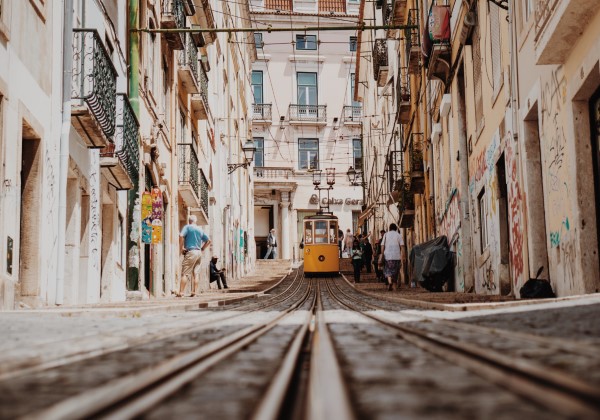
Its mild Mediterranean climate and proximity to beautiful beaches offer year-round outdoor opportunities, while an excellent healthcare system and relatively low cost of living compared to other European cities ensure retirees’ well-being and financial comfort.
Porto
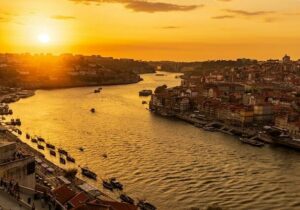
Its charming blend of old-world charm and modern amenities creates a unique living environment.
Porto’s picturesque setting along the Douro River, coupled with its UNESCO World Heritage sites and historic architecture, offers retirees a captivating backdrop for their golden years.
Algarve
The Algarve region is regarded as one of the best places to retire in Portugal, drawing retirees with its stunning coastline, year-round sunshine, and relaxed lifestyle. Moreover, the Algarve boasts a well-developed infrastructure, including modern healthcare facilities, excellent transportation networks, and a wide range of amenities.
Cascais
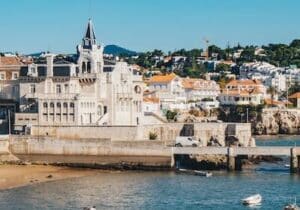
The town’s proximity to Lisbon provides retirees with easy access to the capital.
With its blend of natural splendor, cultural heritage, and modern comforts, Cascais presents retirees with a great option for an enjoyable retirement in Portugal.
Funchal (Madeira)
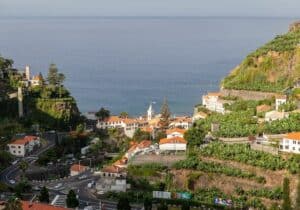
Retirees in Funchal can take advantage of the island’s mild climate, which ensures comfortable temperatures year-round, perfect for outdoor activities such as hiking, gardening, or simply relaxing in one of the city’s many parks or botanical gardens.
Ponta Delgada (Azores)
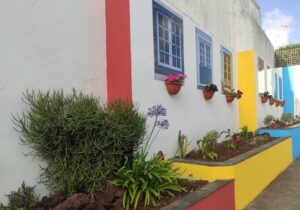
Beyond its natural allure, Ponta Delgada offers retirees a vibrant cultural scene, with museums, galleries, and local festivals celebrating the rich Azorean heritage.
Why choose Global Citizen Solutions for your Immigration Visa?
GLOBAL APPROACH BY LOCAL EXPERTS
- GCS has offices located across Portugal.
- Members of the US-Portugal and UK-Portugal Chambers of Commerce in Portugal, and the Investment Migration Council (IMC).
- Our expert team can help you throughout your journey to secure your Visa.
100% APPROVAL RATE
- Our successful track record in applications provides reassurance to applicants.
- We have helped clients from more than 35 countries secure residency in Portugal.
ALL-ENCOMPASSING SOLUTION
- With a single channel of communication, our approach ensures that you have complete clarity on your application.
- Our BeGlobal® Onboarding System allows for a total flow of information.
TRANSPARENCY AND PRIVACY
- Our pricing is clear and detailed, you will not face any hidden costs.
- All data is stored within a GDPR-compliant database on a secure SSL-encrypted server.

Frequently asked questions about the Portuguese Retirement Visa
Can I get permanent residency in Portugal with a Retirement Visa?
Neither the Retirement Visa D7 nor the Golden Visa guarantees or directly grants permanent residency in Portugal. However, these two visas serve as pathways toward permanent residency and even citizenship, depending on certain conditions and the duration of your stay.
Can I retire in Portugal with the Golden Visa?
If you are a non-EU citizen willing to make a qualifying investment into an official Golden or residency by investment visa program, you can retire in Portugal.
Do I need to speak Portuguese to retire in Portugal?
While speaking Portuguese isn’t a strict requirement to retire in the country, it can greatly enhance your experience and ease daily interactions. Many locals speak English, but proficiency in Portuguese can facilitate integration and access to services. Consider language classes or immersion programs to better navigate life in Portugal and fully enjoy your retirement experience.
What are the retirement visa income requirements?
Applicants need to prove a passive income outside of Portugal that is €870.00 or more per month. Passive income can be through a pension, rental income, or other means.
An additional 50 percent of the income is required for a spouse and 30 percent for a child if you include relatives in the application.
Is health insurance a retirement visa requirement?
Yes, applicants must have travel insurance for their visa application and private medical aid by their AIMA appointment for coverage while in Portugal.
Private medical insurance plans in Portugal can be paid via direct debit from your new Portuguese bank account. After moving, you can enroll in the Portuguese healthcare system (SNS), provided by the Portuguese government, which will help with your residence permit renewal
How much money do you need for a retirement visa in Portugal?
Applicants for the Portugal D7 Visa need to prove a stable passive income of €870.00 or more per month. An additional 50 percent of the income is required for a spouse and 30 percent for a child if you include relatives in the application.
Can I retire in Portugal as a US citizen?
Yes, Portugal actually ranks as one of the best countries for US citizens to retire abroad.
As a US citizen, you do not need a visa for short stays (up to 90 days) in Portugal or other Schengen Area countries for tourism purposes.
However, if you plan to stay longer for retirement, you must apply for a long-term visa, such as a Portugal Investment visa or a D7 Visa.
What are the cons of retiring in Portugal?
Some of the cons of retiring in Portugal include the fact that bureaucracy can be quite slow and homes can be quite cold in the winter months—make sure you have good insulation in place. Also, in some more remote areas, you may need to be somewhat familiar with the Portuguese language.
Can I travel to other EU countries if I retire in Portugal?
Yes, if you get a Portuguese Retirement Visa, you can enjoy visa free travel within the 29 countries included in the Schengen Area.
Will my US pension be taxed in Portugal?
Portugal has a tax treaty with the United States to avoid double taxation on pensions. Generally, your US pension will be taxed in Portugal, but you may be eligible for certain exemptions or reductions under the treaty.
Where can I apply for a Portugal D7 visa?
To begin your application, apply at the Portuguese Consulate or Embassy in your home country and demonstrate a stable passive income. Under Portuguese law, the D7 Visa grants a temporary residence permit for two years, renewable for three more years.
After five years in Portugal, if you meet all requirements of Portuguese law, you can apply for citizenship and obtain a Portuguese passport
How long does it take to get a Portugal Retirement Visa?
Getting a Retirement Visa in Portugal usually takes at least 4 months. About two more months are required to obtain residency and receive a residence permit card. For example, the NIF is a unique taxpayer number required to open a bank account in Portugal.

